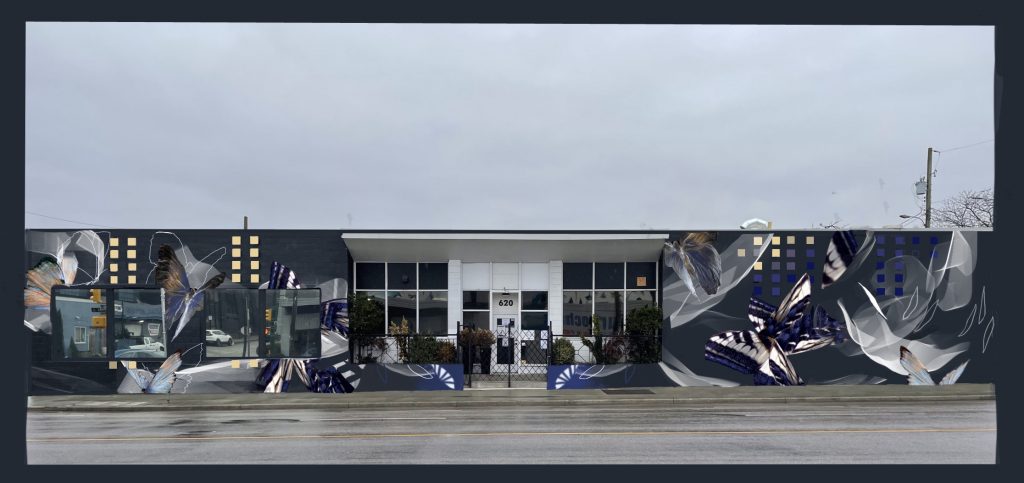
Mural Title: Imaginal Discs, by Jennifer Clark – Butterflies and moths are the primary imagery on this piece represented as symbols of transformation. They are changing, shifting, and forming through the process of metamorphosis. The same can be said for the community at Kettle, their lives are shifting in new directions. The flight of the butterfly is symbolic of hope, the yellow and blue squares reference light, matter, pixels, stars and individuals in a community, together. The white forms in the background bring light, something necessary to illuminate a path forward. Nature carries within its design a kind of poetry that we can learn from. Maybe if we study and appreciate the complexity of nature we will take good care of it, as well as ourselves, because the two are connected and are part of a bigger whole.
The model, originally from Seattle, will be the first of its kind in Canada. Margaret Hope, Co-founder of 625 Powell Street Foundation with her late husband, Carl Vanderspek, bought and renovated the building for Vancouver’s first Recovery Café.
“I walked in the door at the flagship Seattle location for the first time, and you could feel the love,” says Margaret. “The key people we talked to were amazing. I loved being involved in the volunteer work – I helped in the kitchen and was able to bump into members and staff all the time.”
The Recovery Café is a generic, membership-based recovery model. Members can choose to recover from trauma, loneliness, unemployment, substance use, mental health challenges, homelessness, or poverty. Members commit to attending mandatory weekly recovery circles where they check in on their goals and support each other. They contribute to the care of their facility and the operation of the community. They can also partake in communal activities, life skills workshops, and share warm meals with other.
“Recovery Café provides a space and opportunities to transform their lives. Recovery is about going running or walking together at lunch. It’s about having a pet and learning to care of them or looking after your teeth. And it’s learning to do these things with the support of the community. There’s a hopefulness about it and a practicality. No task is too small to be addressed. I love that about it,” says Margaret. “And we need the Recovery Café in Vancouver because it’s a flexible space where people can come to work on their recovery, even when they may have other responsibilities like a job or caring for their children.”
Important to 625 Powell Street Foundation is the concept of mutual accountability explains Margaret. The Recovery Café is a best practice model that follows the three core principles of therapeutic communities: promoting personal-agency and a sense of belonging, ensuring everyone has a voice (democracy), and developing mutual concern and accountability for one another.
“They’re building out their lives, we are not simply giving them stopgap measures,” she says. “We’re saying ‘come and address your issues. And food is one of the perks, and a nice place to be is a perk and a community of people who love and care about you – that’s one of the perks.’”
Killian Noe, co-founder of the original Recovery Café in Seattle, often tells a story of the importance of their commitment to excellence and beauty – that every single expression at the Recovery Café must communicate love, from materials used in the space to the nutritious meals and dinnerware. The Vancouver location does just that.
“I’m excited that the building looks like a place you’d want to belong to. My hope is that every person who joins the Recovery Café will feel honoured that somebody feels they deserve this kind of love,” says Margaret.
